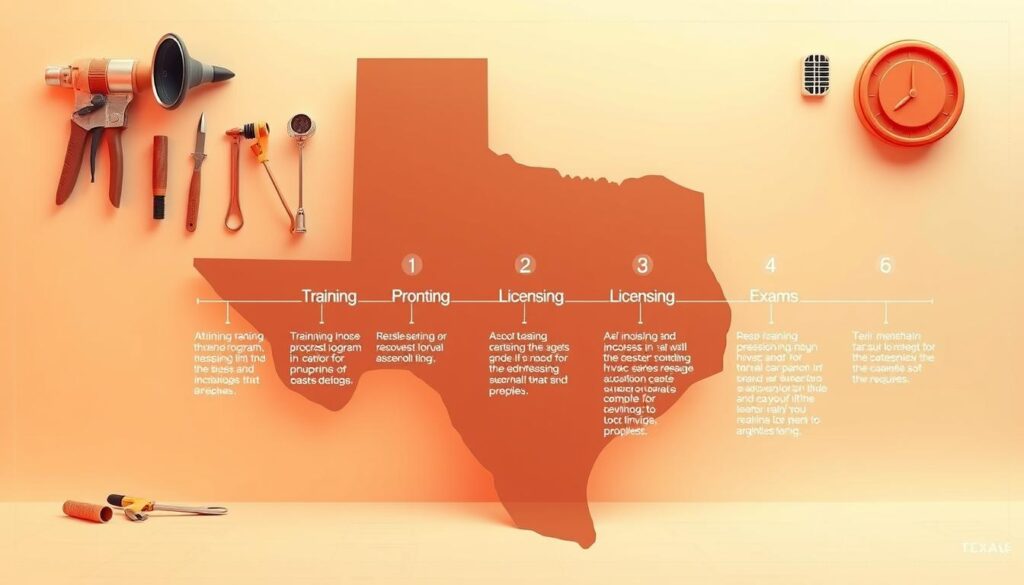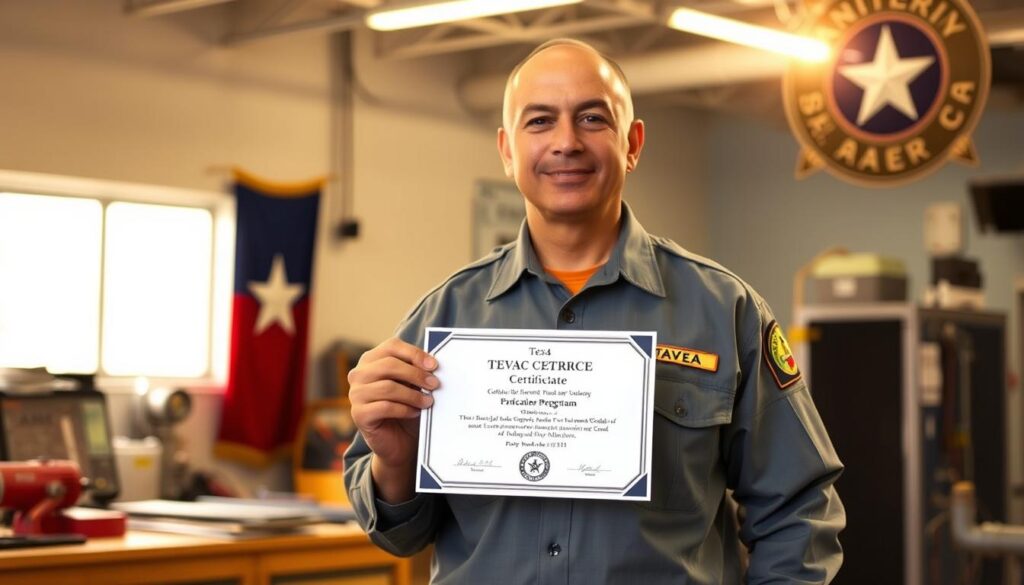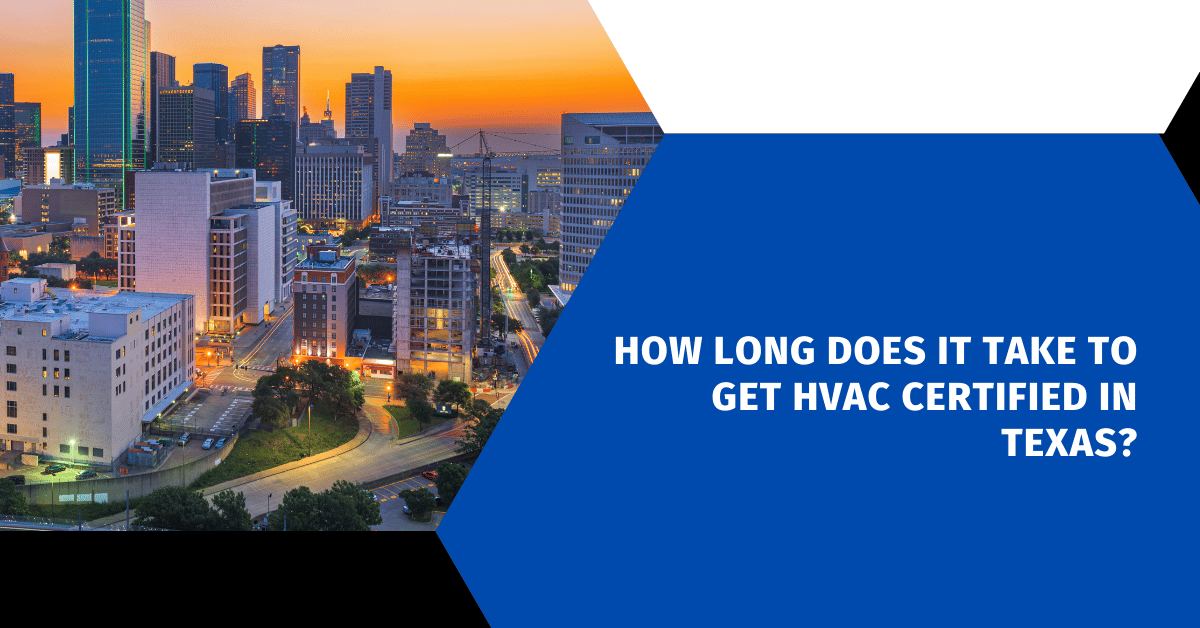Affiliate Disclosure
HVAC Guide Guys is a participant in the Amazon Services LLC Associates Program, an affiliate advertising program designed to provide a means for sites to earn advertising fees by advertising and linking to Amazon.
How Long Does it Take to Get HVAC Certified in Texas? Ever thought about switching to an HVAC career in Texas? The journey to HVAC certification is more than just time. It’s about planning and knowing the right steps.

There are different ways to get HVAC certified in Texas, each with its own timeline. You can choose vocational training, apprenticeships, or on-the-job learning. The time it takes to become a certified HVAC technician can be anywhere from six months to five years.
Several things affect how long it takes to get certified. These include your educational path, how fast you learn, and Texas’s specific requirements. Beginners can start as Registered Technicians quickly. But, full certification needs more training and experience.
Key Takeaways
- HVAC certification in Texas can take between 6 months to 5 years
- Multiple training paths exist, including vocational schools and apprenticeships
- Texas has specific licensing and certification requirements
- Continuous learning is key to keeping your certification
- More advanced certifications open up more career opportunities
Table of Contents
Understanding HVAC Certification Requirements in Texas
Getting an HVAC certification in Texas can be tricky. The state has clear rules to make sure HVAC work is top-notch and safe. To become a certified HVAC tech, you must meet several important criteria.
The hvac certification requirements in Texas include several key steps. You’ll need to put in time and effort to meet the state’s high standards.
Basic Eligibility Criteria
To start the hvac certification process in Texas, you must meet some basic requirements:
- Minimum age of 18 years
- High school diploma or equivalent
- Clean criminal background
- Ability to pass physical and technical examinations
Types of HVAC Certifications
In Texas, there are two main HVAC licenses:
| License Type | Work Permissions |
|---|---|
| TACLA (Class A) | Work on all equipment without restrictions |
| TACLB (Class B) | Limited to cooling systems up to 25 tons and heating systems up to 1.5 million BTUs/hour |
EPA Certification Requirements
The EPA has specific rules for handling refrigerants in HVAC work:
- Type I: Small appliances (5 pounds or less refrigerant)
- Type II: High-pressure units (5 pounds or more refrigerant)
- Type III: Low-pressure service appliances
- Universal: Covers all system types
All Texas HVAC licenses need EPA refrigeration certification. This shows the state’s focus on professional standards and safety.
Explore Our HVAC Shop
Looking for top-rated HVAC tools, parts, and accessories? Visit our shop and find the perfect solution for your needs.
Visit the ShopHVAC License Classes and Endorsements in Texas
To get an hvac license in Texas, you need to know about the different classes and endorsements. Texas has two main HVAC license classes. These classes decide what kind of work you can do.
The two main hvac technician certification texas license classes include:
- Class A License: Allows work on units of any size
- Class B License: Limited to smaller cooling systems (25 tons or less) and heating systems under 1.5 million BTUs/hour
There are special endorsements for Texas HVAC professionals. These endorsements let you do more in your job:
- Environmental Air Conditioning
- Commercial Refrigeration
- Process Cooling or Heating
“Choosing the right license class and endorsement can significantly impact your HVAC career trajectory in Texas.”
At first, you can work under a registered status without a full license. You must work under a licensed contractor’s watch. To move up, you need work experience and to meet certain certification needs.
For full licensure, you have two options. You can work supervised for 48 months. Or, you can be a Certified Technician for 12 months with 36 months of supervised experience.
Explore Our HVAC Shop
Looking for top-rated HVAC tools, parts, and accessories? Visit our shop and find the perfect solution for your needs.
Visit the ShopThe Path from Registration to Certification
Getting an hvac certification in Texas is a journey. It starts with being a registered technician and ends with full certification. The process has many stages to check if you’re ready for the job.
First, you become a registered technician. This lets you work under a pro while you get ready for full certification.
Registered Technician Process
To be a registered technician in Texas, you must do a few things:
- Submit your application within 48 months of finishing your program
- Pay a $50 application fee that’s not refundable
- Get a registration that’s good for 1 year from when it’s issued
- Finish all licensing needs within 1 year of applying
Certified Technician Requirements
To become a certified technician, you need to meet tougher standards:
- Get 24 months of hands-on experience under a supervisor
- Finish a 2,000-hour training program
- Pass a licensing exam
- Keep your professional record clean
License Endorsement Options
| License Type | Restrictions | Experience Required |
|---|---|---|
| Class A License | No size restrictions | 36 months practical experience |
| Class B License | Limited to 25-ton cooling systems | 24 months supervised work |
Pro tip: Each endorsement has its own career path in the HVAC field. Pick the one that fits your goals and interests.
How Long Does it Take to Get HVAC Certified in Texas
Getting HVAC certified in Texas involves several steps. The time it takes can vary based on your path and personal situation. Generally, it takes between 6 months to 2 years to complete the certification.
Exploring HVAC certification in Texas reveals important milestones:
- Certificate programs: About 9 months
- Full-time training programs: Around 6 months
- Associate degree programs: Usually 2 years
- Apprenticeship programs: 2-3 years
The Texas Department of Licensing and Regulation (TDLR) sets rules for HVAC certification. After finishing your training, you must:
- Submit a completed application
- Pass the licensing exam with a score of 70% or higher
- Show proof of 2,000 hours of both instruction and practical experience
Pro tip: The application process usually takes 7-10 days to get testing info. TDLR will give you your license within three weeks after you pass.
Your timeline can be affected by:
- The educational path you choose
- Whether you study full-time or part-time
- Any work experience you have
- When classes are available
With over 31,000 licensed HVAC contractors in Texas, the job market is promising. It’s for those who are willing to put in the time to train and get certified.
Explore Our HVAC Shop
Looking for top-rated HVAC tools, parts, and accessories? Visit our shop and find the perfect solution for your needs.
Visit the ShopHVAC Training Program Options in Texas
If you want to start a career in heating, ventilation, and air conditioning, Texas has many options. You can find hvac certification courses texas to help you reach your goals. It’s important to know about the different training programs to make the right choice for your future in HVAC.
Texas offers several ways to become a certified HVAC professional. The hvac certification programs texas are made for different learning styles and career goals.
Vocational School Training
Vocational schools have structured programs that last from 6 months to 2 years. These programs teach you a lot about:
- Air conditioning systems
- Refrigeration technology
- Heating system maintenance
- Electrical and technical skills
Apprenticeship Programs
Apprenticeship programs in Texas are great for those who want to learn by doing. They last 3 to 5 years and include:
- Classroom instruction
- Supervised on-the-job training
- Mentorship from experienced professionals
On-the-Job Training
Many HVAC companies in Texas offer on-the-job training. This way, you can earn while you learn, getting real-world experience from experienced technicians.
The cost to get HVAC certified in Texas is between $2,025 and $3,435. This makes it a reachable career for those who are eager to start.
Military Experience and HVAC Certification

Veterans have special skills that help in getting HVAC certification in Texas. Your time in the military can really help when you’re getting your hvac certification texas. Many veterans who worked with HVAC systems in the military can use that training for civilian certification.
Texas values the technical skills you got in the military. The state has special ways for veterans to turn their military HVAC experience into a professional certification. This makes getting certified easier for those who already know a lot about HVAC from their military days.
- Military HVAC training may exempt you from some supervised work requirements
- Documented military experience can count toward professional certification
- Veterans can potentially reduce their certification timeline
- Specific documentation is required to validate military HVAC experience
To qualify, you’ll need to show detailed records of your military HVAC training and experience. The Texas Air Conditioning Contractors of America (TACLA) looks at each veteran’s application closely. They check the technical skills you got in the military.
Being a veteran can give you big benefits. You might get full or partial exemptions from usual experience needs. Your military background can make you a certified HVAC technician faster. This could save you time and money on certification.
Military experience is a valuable asset in the HVAC certification process, giving a special way to get professional qualification in Texas.
Explore Our HVAC Shop
Looking for top-rated HVAC tools, parts, and accessories? Visit our shop and find the perfect solution for your needs.
Visit the ShopRequired Work Experience for Full Certification
Getting an HVAC certification in Texas needs careful work experience guidelines. To become a fully certified HVAC pro, you must meet certain supervised work experience standards. These standards show your practical skills and knowledge of the industry.
Supervised Work Requirements
To get full HVAC certification in Texas, you need a lot of practical experience. The state has two main paths for work experience:
- 24 months of job site experience under a licensed contractor’s direct supervision
- 48 months of supervised work experience
Your work experience is key in the HVAC certification process in Texas. Technicians must keep detailed records of their training. This ensures every hour counts towards their professional credentials.
Documentation and Verification Process
Proper documentation is vital for verifying your work experience. You’ll need to:
- Keep detailed logs of supervised work hours
- Get signed verification from licensed HVAC contractors
- Provide detailed records of job site activities
The Texas HVAC certification requirements are in place to ensure only qualified professionals enter the field. Accurate record-keeping is your key to successful certification.
Tip: Always keep copies of your work experience documentation and verify each requirement with the Texas licensing board.
HVAC Certification Costs and Application Process
Getting an HVAC certification in Texas needs careful planning. Your path to becoming a certified HVAC pro has several costs. These costs can affect your career investment.

The HVAC certification process in Texas has different costs. Aspiring technicians should know these:
- Application Fees: Range from $50 to $300
- License Types:
- Apprenticeship License: $100 – $200
- Journeyman License: $300 – $500
- Contractor License: $700 – $1,000
- Certification Exam Costs: $25 – $250 per test
Your total cost will depend on the certification level you choose. Educational costs can vary a lot. They can be from $500 to $35,000, based on your training program.
Prospective HVAC technicians should plan their budget well. Many Texas employers help with apprenticeship or certification costs. This can reduce your initial expenses.
Investing in your HVAC certification can lead to substantial career opportunities, with projected job growth of 21% in Texas from 2022 to 2032.
When applying for HVAC certification, collect all needed documents. This includes proof of training, work experience, and ID. Be ready for a detailed application process. It usually takes 2-3 weeks to finish.
Explore Our HVAC Shop
Looking for top-rated HVAC tools, parts, and accessories? Visit our shop and find the perfect solution for your needs.
Visit the ShopExamination Requirements and Preparation
Getting ready for HVAC certification exams in Texas is a big step. You need to know the test structure well. Passing these exams is key to becoming a licensed HVAC technician. The Texas Department of Licensing and Regulation (TDLR) has different exams for Class A and Class B certifications.
The exams are tough. For Class A, you’ll face 120 questions in 230 minutes. Class B has 100 questions in 170 minutes. You need a 70% score to pass both. HVAC courses in Texas suggest you prepare well, as the exams test your technical and practical skills.
One special thing about Texas HVAC exams is they’re open-book. You can use tabbed and annotated materials, which helps a lot. The exam covers topics like the 2021 Uniform Mechanical Code and refrigerant handling. You’ll also need to know specific installation rules.
For the best chance of passing, use good study materials and practice tests. The cost for these is about $1,105.80. Remember, you have one year to pass the exam after applying. Knowing HVAC well is your ticket to getting certified in Texas.
FAQ
How long does it typically take to get HVAC certified in Texas?
What are the basic requirements to become an HVAC technician in Texas?
What types of HVAC certifications are available in Texas?
How much does HVAC certification cost in Texas?
How long does it typically take to get HVAC certified in Texas?
What are the basic requirements to become an HVAC technician in Texas?
What types of HVAC certifications are available in Texas?
How much does HVAC certification cost in Texas?
FAQ
How long does it typically take to get HVAC certified in Texas?
Getting HVAC certified in Texas can take 6 months to 2 years. Vocational schools take 6-12 months. Apprenticeships can last 2-4 years. It depends on your training, how fast you learn, and the certification level you aim for.
What are the basic requirements to become an HVAC technician in Texas?
To be an HVAC technician in Texas, you must be 18 or older. You need a high school diploma or GED. You also have to complete a training program, get EPA certification, and pass exams. Plus, you must register as a technician and meet work experience needs.
What types of HVAC certifications are available in Texas?
Texas has two main HVAC certifications: Registered Technician and Certified Technician. There are also Class A and Class B licenses and endorsements like Environmental Air Conditioning. Each has its own requirements and work scope.
How much does HVAC certification cost in Texas?
HVAC certification costs range from
FAQ
How long does it typically take to get HVAC certified in Texas?
Getting HVAC certified in Texas can take 6 months to 2 years. Vocational schools take 6-12 months. Apprenticeships can last 2-4 years. It depends on your training, how fast you learn, and the certification level you aim for.
What are the basic requirements to become an HVAC technician in Texas?
To be an HVAC technician in Texas, you must be 18 or older. You need a high school diploma or GED. You also have to complete a training program, get EPA certification, and pass exams. Plus, you must register as a technician and meet work experience needs.
What types of HVAC certifications are available in Texas?
Texas has two main HVAC certifications: Registered Technician and Certified Technician. There are also Class A and Class B licenses and endorsements like Environmental Air Conditioning. Each has its own requirements and work scope.
How much does HVAC certification cost in Texas?
HVAC certification costs range from $1,500 to $15,000. This includes training, exam, and application fees. Vocational schools and community colleges are often cheaper than private programs.
Can military veterans get HVAC certification faster in Texas?
Yes, veterans can get HVAC certification faster in Texas. Military experience can count towards work requirements. Many veterans qualify for quicker certification. Some programs also offer special support for veterans.
What is the EPA certification, and is it mandatory?
The EPA certification is needed for HVAC technicians working with refrigerants. It’s a mandatory exam that shows you know how to handle refrigerants safely. Most technicians get Type II certification.
What are the work experience requirements for full HVAC certification?
For full certification in Texas, you need 8,000 hours (about 4 years) of supervised work. This must be documented and verified. You’ll need to work in various HVAC roles to qualify.
Are there different license classes for HVAC technicians in Texas?
Yes, Texas has Class A and Class B HVAC licenses. Class A lets you work on bigger, more complex systems. Class B is more limited. Each class has its own requirements and work scope.
,500 to ,000. This includes training, exam, and application fees. Vocational schools and community colleges are often cheaper than private programs.
Can military veterans get HVAC certification faster in Texas?
Yes, veterans can get HVAC certification faster in Texas. Military experience can count towards work requirements. Many veterans qualify for quicker certification. Some programs also offer special support for veterans.
What is the EPA certification, and is it mandatory?
The EPA certification is needed for HVAC technicians working with refrigerants. It’s a mandatory exam that shows you know how to handle refrigerants safely. Most technicians get Type II certification.
What are the work experience requirements for full HVAC certification?
For full certification in Texas, you need 8,000 hours (about 4 years) of supervised work. This must be documented and verified. You’ll need to work in various HVAC roles to qualify.
Are there different license classes for HVAC technicians in Texas?
Yes, Texas has Class A and Class B HVAC licenses. Class A lets you work on bigger, more complex systems. Class B is more limited. Each class has its own requirements and work scope.

